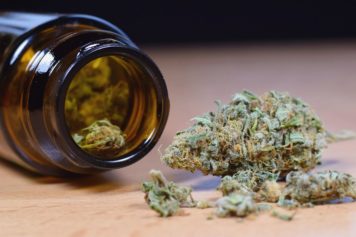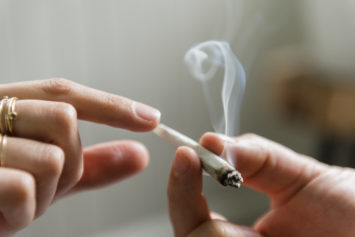
Photo courtesy of 123rf.com
The road to the legalization of marijuana just took another turn, as states will now have an even tougher time policing recreational and medicinal use of the drug. According to a new analysis completed by the AAA Foundation for Traffic Safety, many of the laws put in place to catch drugged drivers are based on “junk science.”
The traffic safety analysts concluded that a blood test accurately detecting whether an individual is impaired by the effects of marijuana doesn’t exist, Think Progress reports. The study states that “the data do not support science-based per se limits for THC” when it comes to states’ drugged driving laws.
To put it in layman’s terms, there’s no way to set a blood-test threshold for THC, the chemical in marijuana that gets people high, that can reliably detect if a driver is impaired. However, five of the six states that allow marijuana use have laws that automatically deem a person guilty if they test higher than the limit, or not guilty if they test below the limit, The Associated Press reports.
According to Think Progress, prior research concerning drugged driving blood tests have come to the same conclusion. This poses a problem, according to the foundation, as unsafe drivers could walk free while others are wrongfully imprisoned.
Determining if a driver is under the influence of THC can be tricky as the level of impairment depends a lot on the person being tested. Per The Associated Press, an individual with high levels of THC in their system might not be impaired, especially if they use marijuana often, while the judgement of an individual with lower THC levels could be impaired. Testing can be further complicated as THC can remain in the system for weeks at a time, long after the effects of the drug have worn off, Think Progress reports.
“There is understandably a strong desire by both lawmakers and the public to create legal limits for marijuana impairment in the same manner we do alcohol,” said Marshall Doney, AAA’s president and CEO. “In the case of marijuana, this approach is flawed and not supported by scientific research.”
The nation’s largest automobile club is now suggesting that Colorado, Montana, Nevada, Ohio, Pennsylvania and Washington get rid of their laws based on the false notion that drivers become impaired when a certain level of THC is present in their systems. According to the Associated Press, AAA recommends replacing the laws with ones that utilize specially trained officers to determine if a driver is impaired. That claim would then be backed up by a test confirming the existence of THC in the blood. Officers would also screen for multiple indicators of drug use, including pupil dilation, tongue color, and behavior, the news source reports.
The Associated Press also reports that nine states, including some that have legalized marijuana for medicinal use, have zero-tolerance laws when it comes to driving under the influence of the drug, thus criminalizing the presence of THC in the driver’s system as well as the metabolites, which can remain in the blood for weeks.
Mark A. R. Kleiman, a New York University professor specializing in issues concerning drugs and criminal policy, said the laws make no sense.
“A law against driving with THC in your bloodstream is not a law you can know you are obeying except by never smoking marijuana or never driving,” he said.
Instead of changing the laws, Kleinman suggests making the offense a traffic violation.
The report concerning the scientific basis for laws on marijuana and driving comes on the heels of another report by the AAA Foundation for Traffic Safety. That study revealed a spike in the number of fatal car wrecks in Washington state since the legalization of marijuana, CNN Money reports. Deadly crashes involving drivers who recently used marijuana more than doubled, according to the study. Per CNN Money, the percentage of fatal accidents involving cannabis jumped from 8 percent in 2013 to 17 percent in 2014.
“The significant increase in fatal crashes involving marijuana is alarming,” said Peter Kissinger, CEO of the foundation. “Washington serves as an eye-opening case study for what other states may experience with road safety after legalizing the drug.”


